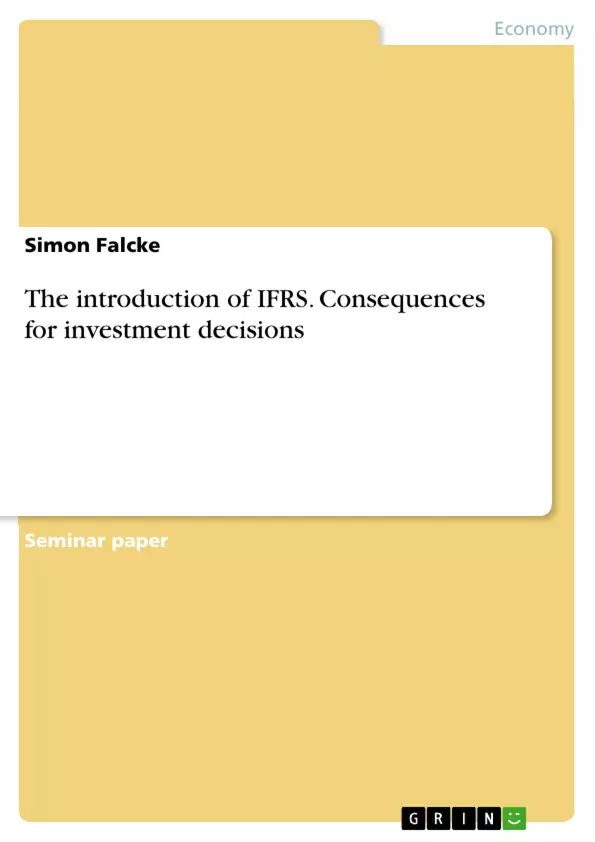Starting in 2005, the portion of foreign shareholders in the Dax has risen from 45% to 58% in the last decade. In the same year, the regulation of the European Union from 2002 came into effect which required all listed firms in the European Union to report their consolidated accounts in accordance with the International Financial Reporting Standard (IFRS) from 2005 on instead of each countries’ generally accepted accounting standards (GAAP). This is just one example where the volume of investments increased concurrently with the adoption of IFRS.
Therefore, the question arises if the mandatory adoption of IFRS in the EU in 2005 or in other cases significantly affected and continues to affect investment decisions among adopters or third parties. In order to better account for differences between different types of investors and investees, we differentiate between retail investors, institutional investors and corporate finance activities. Moreover, we focus on the consequence of IFRS adoption on equity investment decisions as most research appears to focus on the equity instead of the credit market. Additionally, Lourenco & Branco point out that most research which finds no significant effects of IFRS adoption on investment decisions appears to focus on voluntary adoption before 2005.
Thus, this paper mainly focuses on mandatory IFRS adoption. In this context, research suggests that mandatory IFRS adopters experience significant capital markets benefits as well as enhanced foreign institutional ownership and enhanced M&A activity. Ultimately, we observe four overarching drivers behind the aforementioned observations that impact investment decisions across different types of investors and investees.
Inhaltsverzeichnis (Table of Contents)
- Introduction
- Background
- Effect on different types of investors and investees
- Retail investors
- Institutional investors
- Corporate finance
- Financing decisions
- Internal investments
- Strategic and financial investment
- Overall drivers
- Credible implementation and legal enforcement
- Changes in uniformity
- Accounting distance
- Improved quality of accounting information
- Conclusion
Zielsetzung und Themenschwerpunkte (Objectives and Key Themes)
This paper aims to explore the impact of the mandatory adoption of IFRS in the EU on investment decisions. It investigates whether and how improved comparability and transparency through IFRS adoption affect investors and investees. The paper differentiates between retail investors, institutional investors, and corporate finance activities, focusing on the consequences of IFRS adoption on equity investment decisions.
- Impact of IFRS adoption on investment decisions.
- Influence of IFRS on different types of investors and investees (retail, institutional, and corporate).
- Drivers of investment decision changes following IFRS adoption, including enhanced transparency, comparability, and credible implementation.
- Relationship between IFRS adoption and capital market benefits, foreign institutional ownership, and M&A activity.
- Analysis of the effects of IFRS on equity investment decisions.
Zusammenfassung der Kapitel (Chapter Summaries)
The introductory chapter discusses the increasing proportion of foreign shareholders in the DAX and highlights the mandatory adoption of IFRS in the EU in 2005. The paper then explores the question of whether IFRS adoption affects investment decisions. The chapter emphasizes the focus on equity investment decisions and mandatory IFRS adoption.
Chapter two provides background information on IFRS, explaining its purpose and the process of its implementation in the EU. It highlights research findings suggesting that IFRS adoption leads to increased comparability and transparency, potentially benefiting capital markets. The chapter discusses how improved transparency mitigates information asymmetry and makes financial information more predictable, ultimately influencing investor decision-making.
Chapter three focuses on the effects of IFRS adoption on different types of investors and investees, acknowledging that investors pursue different goals and utilize financial reporting in diverse ways. This chapter introduces the concept of general implications of IFRS adoption applicable to all investor types.
Schlüsselwörter (Keywords)
The paper focuses on the impact of IFRS adoption on investment decisions, exploring the consequences for retail investors, institutional investors, and corporate finance activities. Key themes include enhanced transparency, comparability, information asymmetry, capital market benefits, foreign institutional ownership, and M&A activity. The paper mainly focuses on the effects of mandatory IFRS adoption on equity investment decisions.
Frequently Asked Questions
What was the impact of mandatory IFRS adoption in the EU?
Mandatory adoption in 2005 led to increased transparency and comparability of financial statements, which significantly influenced investment decisions across the EU.
How does IFRS affect institutional investors?
IFRS enhances foreign institutional ownership by providing a uniform accounting language, making it easier for investors to compare firms across different borders.
Does IFRS adoption influence M&A activities?
Yes, research suggests that the improved quality of accounting information and reduced information asymmetry lead to enhanced merger and acquisition (M&A) activity.
What is "accounting distance"?
It refers to the difference between a country's local GAAP and IFRS. A larger distance usually means a more significant impact when transitioning to IFRS.
Why did the study focus on mandatory rather than voluntary adoption?
Mandatory adoption provides more significant capital market benefits and shows clearer trends in investment behavior compared to voluntary adoption before 2005.
- Citar trabajo
- Simon Falcke (Autor), 2019, The introduction of IFRS. Consequences for investment decisions, Múnich, GRIN Verlag, https://www.grin.com/document/902569



